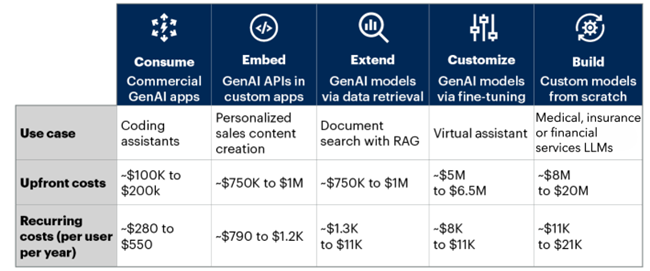A major challenge for organisations arises in justifying the substantial investment in GenAI for productivity enhancement, which can be difficult to directly translate into financial benefit, according to Gartner. Many organisations are leveraging GenAI to transform their business models and create new business opportunities. However, these deployment approaches come with significant costs, ranging from $5 million to $20 million (see Figure 1).
Rita Sallam, Distinguished VP Analyst at Gartner said, “After last year's hype, executives are impatient to see returns on GenAI investments, yet organisations are struggling to prove and realise value. As the scope of initiatives widen, the financial burden of developing and deploying GenAI models is increasingly felt.”
“Unfortunately, there is no one size fits all with GenAI, and costs aren’t as predictable as other technologies,” said Sallam. “What you spend, the use cases you invest in and the deployment approaches you take, all determine the costs. Whether you’re a market disruptor and want to infuse AI everywhere, or you have a more conservative focus on productivity gains or extending existing processes, each has different levels of cost, risk, variability and strategic impact.”
Regardless of AI ambition, Gartner research indicates GenAI requires a higher tolerance for indirect, future financial investment criteria versus immediate return on investment (ROI). Historically, many CFOs have not been comfortable with investing today for indirect value in the future. This reluctance can skew investment allocation to tactical versus strategic outcomes.
Realising Business Value
Earlier adopters across industries and business processes are reporting a range of business improvements that vary by use case, job type and skill level of the worker. According to a recent Gartner survey, respondents reported 15.8% revenue increase, 15.2% cost savings and 22.6% productivity improvement on average. The survey of 822 business leaders was conducted between September and November 2023.
“This data serves as a valuable reference point for assessing the business value derived from GenAI business model innovation,” said Sallam. “But it’s important to acknowledge the challenges in estimating that value, as benefits are very company, use case, role and workforce specific. Often, the impact may not be immediately evident and may materialise over time. However, this delay doesn’t diminish the potential benefits.”
Calculating Business Impact
Gartner said that by analysing the business value and the total costs of GenAI business model innovation, organisations can establish the direct ROI and future value impact. This serves as a crucial tool for making informed investment decisions about GenAI business model innovation.
“If the business outcomes meet or exceed expectations, it presents an opportunity to expand investments by scaling GenAI innovation and usage across a broader user base, or implementing it in additional business divisions,” said Sallam. “However, if they fall short, it may be necessary to explore alternative innovation scenarios. These insights help organisations strategically allocate resources and determine the most effective path forward.”







